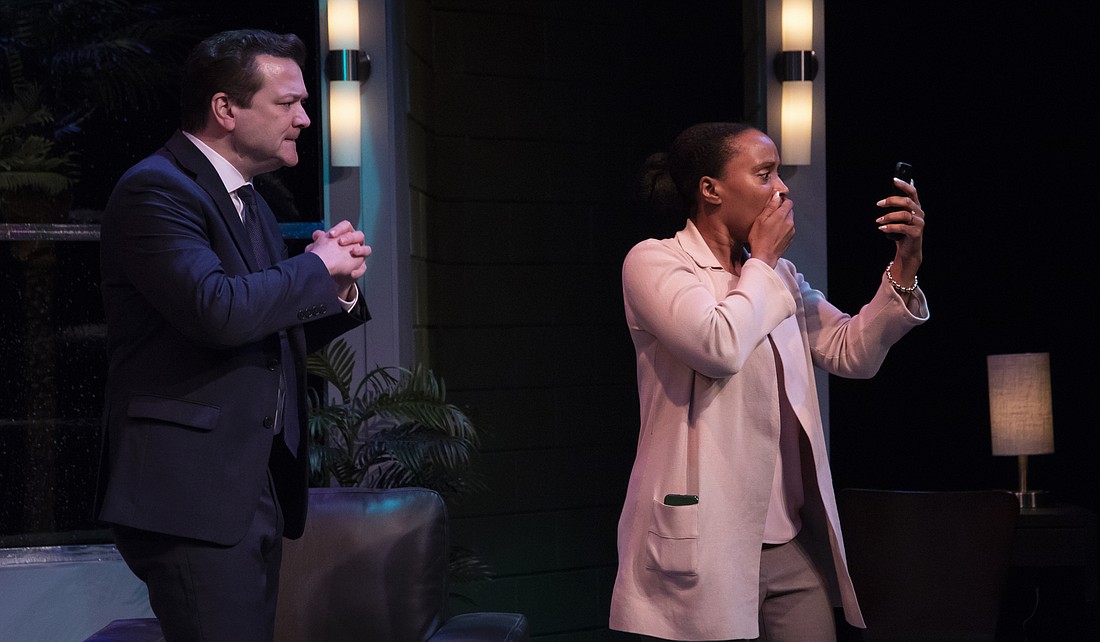- December 16, 2025
-
-
Loading

Loading

Christopher Demos-Brown’s “American Son” is burning up the stage at Florida Studio Theatre. The play is political, personal and topical. It’s also a slowly building horror story.
Kendra (Almeria Campbell) shows up at a police station in Miami-Dade County at 4 a.m., oblivious to the deluge outside. She’s an African-American woman in her 40s, a professor of psychology.
But right now, she’s frantic. Eight hours ago, Jamal, her 18-year-old son, drove off in his father’s car. He’s now been gone for most of the night and is not returning her calls. Kendra knows something’s wrong. He’s a prep school wunderkind, headed for West Point. A responsible kid. Disappearing into the night just isn’t his style.
“Where is my son?” Kendra demands answers, now. Officer Larkin (Daniel Petzold), the rookie police officer on duty, won’t give her any. But Larkin happily shares a few details when Scott (Rod Brogan), Kendra’s recently separated husband, shows up flashing his FBI agent badge. Larkin quickly bonds with him, and it’s easy to see why. They’re both police officers. And they’re both white.
So what happened?
According to Larkin, there was an “incident.” Jamal was driving with two other black youths. The police stopped them. That’s all Larkin knows.
Scott shrugs it off. In his world, an “incident” means boys will be boys. To Kendra, it means her son could be dead.
That’s it. Now there’s nothing to do but wait.
While Scott and Kendra wait, they replay the old arguments that drove them apart. Race is usually the subtext. Scott doesn’t get the constant humiliation of the black experience and scoffs at the notion of “micro-aggressions.” We’re an upper-middle class family. Relax.
Larkin promises real answers when his superior, Lieutenant Stokes (Lawrence Evans), shows up.
When Stokes finally appears, Scott gets in his face— and Stokes (an African-American) puts him in handcuffs. When the station quiets down, he answers a few of Kendra’s questions, except for, “Is my son still alive?”
Demos-Brown isn’t always subtle. He doesn’t try to be. Director Kate Alexander keeps his white-hot polemics in laser beam focus. You might not agree. But there’s no way you’ll miss the point.
Campbell’s Kendra is a bundle of nerves, but she keeps it together with sheer willpower. She’s the smartest person in the room, but doesn’t flaunt her brainpower unless she’s backed to the wall. Brogan portrays her estranged husband, Scott, as a deeply committed father. He still can’t fathom the emotional damage he’s done to Jamal by walking out on Kendra. Petzold’s Officer Larkin isn’t lacking in brains, just experience. He means well, and doesn’t grasp the racist implications of a question like, “Does your son have any gangster tattoos?” Evans’ Lieutenant John Stokes is a man who’s paid his dues and doesn’t take crap from anybody. But he’s perfectly happy to give it — and relishes the opportunity to show Agent Scott how it feels to be thrown to the floor and shackled in handcuffs.
The story unfolds in the limbo of a Miami-Dade police station where these souls are bottled up together. Isabel and Moriah Curley-Clay’s set strikes the right note with generic furniture and a few failed attempts to create cheer. Thom Beaulieu’s cold lighting has all the warmth of a morgue. Mari Taylor’s costumes are either uniforms or random clothes two panicked parents have thrown together. They add to the sense of a disjointed half-world, a few steps removed from normal reality.
To state the bloody obvious, this play revolves around racial politics. But its deeper issues are universal. Kendra and Scott don’t know if their son is alive or dead.
Jamal is the human equivalent of Schrödinger's cat. The uncertainty cuts like a knife and the tension slowly builds. It’s every parent’s worst nightmare. At the end of the long night, Scott and Kendra might wake up from it.
But countless marginalized parents won’t.